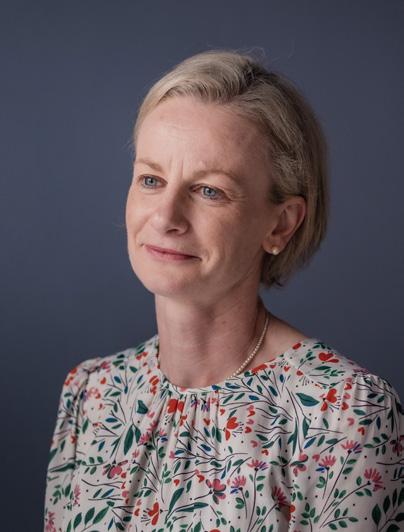
7 minute read
Mrs. Alex Hutchinson
FROM JAMES ALLEN’S GIRLS’ SCHOOL, LONDON
In this episode of Education Corner Podcast, we spoke with Mrs. Alex Hutchinson, Head at James Allen’s GIrls’ School, London. Alex spoke to us about the importance of educating girls and widening access to education.
Alex began her teaching career as a chemistry teacher and then Head of Science, before moving into more leadership roles as Head of Sixth Form, Deputy Head and then Headmistress at schools such as Wimbledon High School and Woldingham School. Alex joined JAGS as Headmistress in 2020 and is also president of the Girls’ Schools Association for 2024-25. Having previously worked at JAGS briefly as a chemistry teacher, Alex described rejoining the school as Headmistress as: “An absolute dream come true!” the library or going to debating club.” Girls are encouraged to experience a wide range of subjects and activities: “We absolutely believe that being busy is a good thing. We’re busy in the classroom. We’re busy outside the classroom. We like to sum it up to say what we have here at JAGS is a real passion for life and learning.” Alex is also conscious of building girls’ who are confident and self-assured, without any danger of arrogance: “The girls are brilliant: they are bright, talented, funny and kind. They’re authentic, they’re big thinkers. We’re very diverse as a community. We really value the individuality of our students and I like to think that we’re a nicely selfassured community, but we’re never arrogant in what we do.”
Located in Dulwich, South London, Alex described JAGS as: “A really amazing, dynamic community.” As an academically selective school, JAGS achieves excellent exam results, but also embraces a wider view of success: “Yes, we’re really proud of the exam results that they achieve, but we’re absolutely not defined by them. We really like to focus on every individual’s definition of success.” As an all-girls school, Alex believes JAGS pupils are free from any gender stereotyping in their interests, with no girls’ subjects or boys’ subjects: “The girls are just as comfortable putting their hand up in a chemistry lesson as they are racing off at lunchtime to go and play hockey or curling up with a book in
Alex also took on the role of President of the GSA for the academic year 2024-25, which she described as: “An extraordinary privilege.” As President, Alex describes her role as “the cheerleader” for girls’ education and it is clear she believes greatly in the role and power of the GSA in this. She states: “We have a common mission. That is to focus on the education of girls. What the GSA does is provide an immediate network of support, of encouragement and of inspiration from like-minded individuals.” In the GSA’s Powering Up Girls guide, Alex said: “There are no glass ceilings in girls’ schools.” Reflecting on this, she shared the immense progress which has been made in girls’ education in the 150 years of the GSA and earlier.
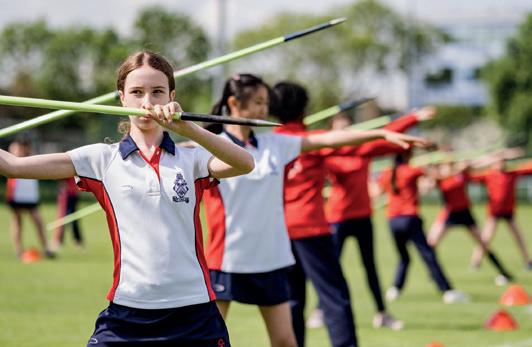

“In a girls school they feel safe in these surroundings, they feel safe to take risks. In a girls’ school, every leadership role is taken by a girl, every superstar on the stage, on the sports pitch or in the orchestra is a girl. So when you leave school, you go into it expecting that there is no choice and no option that is not open to you because you are a girl.”
Whilst JAGS was founded in 1741: “[...] to teach girls to read and sew.”Alex praises the increased opportunities for girls in education today, but stays true to the school’s founding ethos: “To push forward that equality of education for girls. Where we are now is these really empowered communities who are making all sorts of extraordinary choices about their futures.” Despite the over 200 years since the foundation of JAGS, Alex believes that girls’ schools remain just as relevant today: “In a girls school they feel safe in these surroundings, they feel safe to take risks. In a girls’ school, every leadership role is taken by a girl, every superstar on the stage, on the sports pitch or in the orchestra is a girl. So when you leave school, you go into it expecting that there is no choice and no option that is not open to you because you are a girl.”
At JAGS, they believe that all girls should be able to access an environment where they will thrive, regardless of their background and they make significant efforts to widen access to the school through scholarships and bursaries. Alex shared: “The independent sector tends to benchmark at about 7% of students on bursary provision, we’re very proud that we exceed that with about 17% of our senior school students who are on very significant bursary support.” It is not only the pupils in receipt of bursaries who benefit from this, Alex explained: “It’s life changing for members of our community. We’re really proud that that is accessible to so many. The girls in our school come from a broad range of socioeconomic backgrounds; we all learn from that and we are all enriched by that philosophy.”
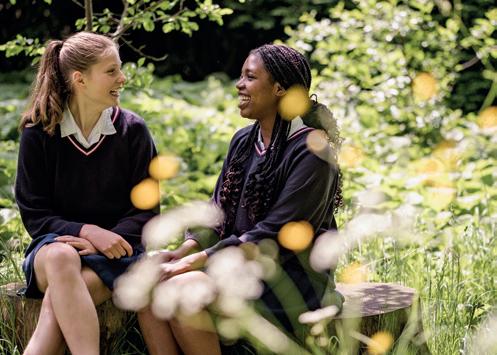
As a leading London school, the JAGS community is very diverse and global, which Alex described as: “A real strength of our school and of our school community.” Deliberate effort is made across school life to recognize and embrace all types of diversity: “We come from different backgrounds, different cultures, different faiths, we have different neurodiversities and we can all fit in equally easily into this community, whether we’re introverts or extroverts, we have different interests and different strengths and weaknesses. We acknowledge that as members of the community.” Studentled initiatives spearhead inclusivity across the school, with dedicated neurodiversity Prefects, whole-school multicultural day celebrations, student societies and committees and collaboration with external agencies to support diverse and inclusive teaching experiences.
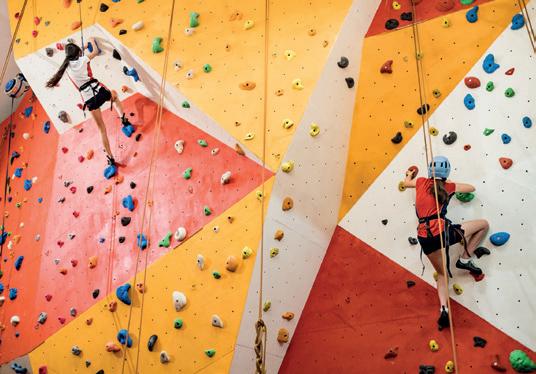
This diversity also feeds the school’s vibrant co-curriculum, which offers clubs and societies for almost any interest, from ‘Do Nothing Club’ to cheerleading or robotics society. By providing these activities and experiences, JAGS aims to provide a comprehensive holistic education and teach students the soft skills needed to thrive beyond school. Alex shared: “Not everything in life needs a qualification. I have played a huge amount of sports through most of my life and a lot of the personal skills and qualities that I have come from a lifelong commitment to sport. My academic qualifications are a completely separate strand, which, yes, have opened doors in life, but largely haven’t defined who I am.”
With the introduction of VAT on school fees at the beginning of the year, many were concerned about the possible impact of this on girls’ education in particular. Alex explained: “Our concern has been that the VAT policy has the potential to disproportionately affect young women at a time when we should be doing everything in our power to support girls and women, their talents and their ambitions to achieve a more equitable world.”
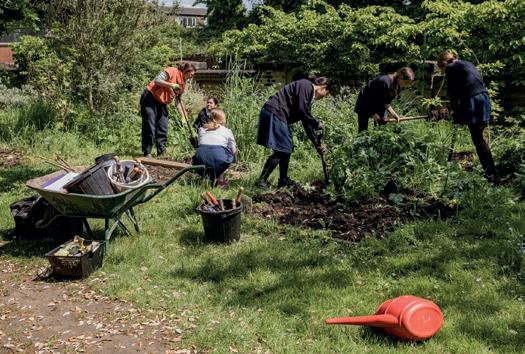
Alex believes strongly in providing parents with a range of choices in regards to their children’s education and fears the possible impact of financial challenges on girls’ schools: “If this policy limits or removes access to those schools for any young woman, then that is a huge step backwards for equality and for the right to choose the education that best fits your daughter.” However, she also remains hopeful and optimistic in the power of girls’ schools, particularly supported by organisations such as the GSA: “Many of the girls’ schools in the UK are complete powerhouses of education.”
Alex remains passionate about girls’ education and looks forward to continuing to champion girls and their education throughout the rest of her time as President of the GSA and beyond, through her role at JAGS and continues work across the sector. “We have historically had such an important role to play and we continue to have such an important role to play. Therefore, it is vital that we protect the best educational opportunities available to young women and we believe that those are through girlsonly schools.” Alex concluded that: “Providing a platform for these girls to be the leaders and the trailblazers of tomorrow is something we genuinely embrace.” www.jags.org.uk
We would like to thank Mrs. Alex Hutchinson, Head at James Allen’s Girls’ School, for giving up her time to speak to us.
Education Corner Podcast With Heads
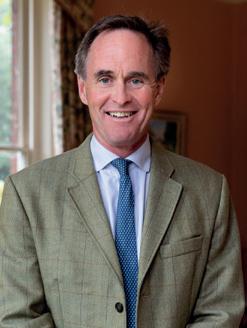
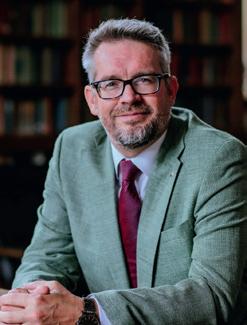
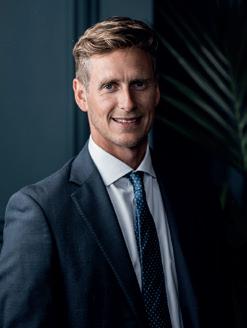
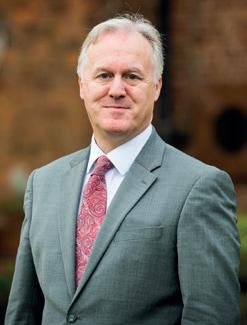
Mr. Simon Barber
FROM LUDGROVE SCHOOL, BERKSHIRE
Mr. Bart Wielenga
FROM BLUNDELL’S SCHOOL, DEVON
Mr. Richard Jones
FROM BRYANSTON SCHOOL, DORSET AND Mr. Gary Hickey
FROM
HABERDASHERS’ ADAMS SCHOOL, SHROPSHIRE
A panel discussion about the differences between single-sex and co-educational boarding, the benefits of boarding and the future of boarding schools.
Mr. Simon Barber, Headmaster of Ludgrove School, Berkshire, believes in the power of both all-boys’ and prep boarding: “You can have a childhood for a bit longer in Year 7 and Year 8. Certainly, our Year 7 and 8 boys are still climbing trees, charging around, getting covered in mud and playing football every moment of the day. I think children haven’t changed a great deal in 50 years, but society has.” Ludgrove benefits from plentiful outdoor space and pupils are encouraged to enjoy time in nature and retain their childhood for longer. Simon also spoke about the importance of finding what’s best for the individual child: “I’m not going to come down and say single-sex is the way forward the whole way through, but what I would say is a happy school is the way forward and we’ve got a very, very happy school.”
Conversely, both Blundell’s School and Bryanston School offer co-educational boarding and day provision. Mr. Bart Wielenga, Head at Blundell’s School, has experience of both singlesex and co-education and agrees with Simon on the importance of finding the best school for the individual. He told us: “I’ve taught in all-boys’ education and in a co-ed environment; both have advantages and disadvantages.” At Blundell’s, pupils are in co-educational boarding houses in Years 7 and 8 and again in Year 13, with single-sex boarding in between: “You want boys and girls to feel comfortable interacting with each other, but at










